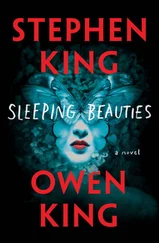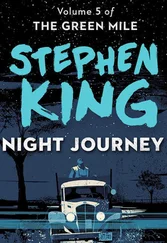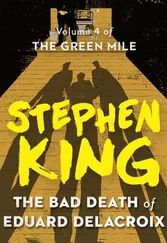Stephen King - Cookie Jar
Здесь есть возможность читать онлайн «Stephen King - Cookie Jar» весь текст электронной книги совершенно бесплатно (целиком полную версию без сокращений). В некоторых случаях можно слушать аудио, скачать через торрент в формате fb2 и присутствует краткое содержание. Год выпуска: 2016, Издательство: VQR, Жанр: Ужасы и Мистика, short_story, на английском языке. Описание произведения, (предисловие) а так же отзывы посетителей доступны на портале библиотеки ЛибКат.
- Название:Cookie Jar
- Автор:
- Издательство:VQR
- Жанр:
- Год:2016
- ISBN:нет данных
- Рейтинг книги:4 / 5. Голосов: 1
-
Избранное:Добавить в избранное
- Отзывы:
-
Ваша оценка:
- 80
- 1
- 2
- 3
- 4
- 5
Cookie Jar: краткое содержание, описание и аннотация
Предлагаем к чтению аннотацию, описание, краткое содержание или предисловие (зависит от того, что написал сам автор книги «Cookie Jar»). Если вы не нашли необходимую информацию о книге — напишите в комментариях, мы постараемся отыскать её.
Cookie Jar — читать онлайн бесплатно полную книгу (весь текст) целиком
Ниже представлен текст книги, разбитый по страницам. Система сохранения места последней прочитанной страницы, позволяет с удобством читать онлайн бесплатно книгу «Cookie Jar», без необходимости каждый раз заново искать на чём Вы остановились. Поставьте закладку, и сможете в любой момент перейти на страницу, на которой закончили чтение.
Интервал:
Закладка:
“That they got along?”
“That’s exactly right, and good for you. My brother Jack and I got along with her, too. Accepted the situation the way young kids usually do, without much complaining or too many questions. We went to visit her quite often. We’d play gin rummy and Crazy Eights and Monopoly. The place was cold in the winter and hotter than a stovepipe in the summer, even with a fan blowing the air around. We had a lot of laughs. She had a ukulele. Sometimes the three of us went out on the back stoop, and she’d play, and we’d sing. Stuff like ‘Old Black Joe’ and ‘Massa’s in the Cold, Cold Ground.’”
“Those were real songs?” Dale glanced at his iPhone. Probably wishing it was still turned on, Rhett thought. Too bad, kid, but you’re not playing this for anybody. Crazy is safer when it goes unrecorded.
“Real songs. Not very politically correct by today’s standards, but that was a different time. A different world, really. We loved her like mad. She was energetic, as manic-depressives often are. Her laughter was free and wild. It was different with Pete. He was the oldest, almost seven when she moved out, and he stayed angry at her until she died. Wouldn’t visit her unless my dad made him, which he eventually gave up doing.”
Then broke down at her funeral, Rhett thought. Cried so hard he fainted and had to be carried outside into the fresh air to revive.
“Probably his feelings were hurt,” Dale said. “Maybe he even thought he was to blame for her leaving.”
Rhett smiled. “You’re a wise child, son. I’m sure it was all of that, and more. In any case, he rarely saw her. Jack and I, though…we didn’t just love her, we were fascinated by her. Nineteen thirty-six was her last good year. Jack was thirteen and I was eleven, which made us old enough to ride across town on the interurban, so we went to see her once or twice a week. Usually on Saturdays, sometimes after school.”
“My mom told me not to ask about yours,” Dale said.
“Because she committed suicide?”
“Yeah. Mom said she might just be a, like, historical figure to me, but she was a lot more to you. When she asks me how it went—and she will—I’ll have to tell her you brought it up.”
“That’s fine,” Rhett said. “And it did hurt. It hurt plenty. I guess it most always does when your mother dies, but suicide is in a class by itself. It hit Jack harder than it did me, because he blamed himself. He thought that because he was older, he should have seen how much worse she was getting. Only it was hard to see, because she was so full of life, and so… so interesting. She’d fly around that place, getting cards or board games or five-hundred-piece Tuco puzzles for the three of us to do. Sometimes she’d crank up her Victrola and try to teach us how to dance the Charleston, and when we wouldn’t, she’d do it by herself, with her shadow on the wall. She’d tell jokes… play her uke… show us how to do magic tricks like the Disappearing Coin and the Floating Handkerchief. And—this is important—she had a big blue ceramic jar on a high shelf with cookies on the side in red. It was always full, and we’d eat them until we were stuffed. All different kinds, all good. That place of hers might not have been much bigger than a garage, but we had plenty of fun there. She saw to it, and I’m not sure even an adult could have seen the truth under all that camouflage.”
“What truth?” Dale asked.
“That she was getting worse. She’d chat away about other worlds, right next to ours, and the alien races that lived there, and how something was out to get her. It talked to her through the electrical sockets, she said, so she unscrewed all the lightbulbs at night and put playing cards over the plug-in plates on the floor. She said the celluloid backs on the cards were very effective at stopping that voice. Only then she’d laugh, like it was all a big joke.”
“Whoo,” Dale said. “Far out.”
“She drew a map on one of the walls, and she was always adding to it. She said it was a country in one of those other worlds. She called it Lalanka, and said it was full of entities. Do you know what that means?”
Dale shook his head.
“Creatures that wanted to come through into our world, but couldn’t. At least not yet. They were bottled up by some restraining force, which was a good thing, because they were hungry. She said that if they ever got into our world, they’d eat everything—not just the people and the animals, but lawns and cars and buildings and even the sky. About other things, though, she was completely rational. She did her little bit of grocery shopping, she kept herself clean and neat, she was very affectionate with me and Jack, and she never failed to ask about Pete. Before we left, she always told us to tell him that he was welcome anytime. ‘I only moved out because it wouldn’t have been safe for you boys and your father if I stayed,’ she said.”
“That’s amazing.”
Rhett shrugged and spread his liver-spotted hands. “Not to us, it wasn’t. We just accepted it. That’s what children do, Dale. But her map—that was amazing. In the last year of her life, there were new things on it every time we visited: mountain ranges, lakes, villages, castles, forests, roads.”
“Did your dad ever see it?”
“Oh yes, many times. He thought it was a genuine work of art, and said it should have been in a gallery someplace. I think he believed that map was one of the few things keeping her on the rails. Along with our visits, of course. These days I suppose some people, smart people, would call it a coping mechanism. Sometimes we’d just sit in her little kitchen, eating sandwiches with the crusts cut off, and she’d ask us about school, and our friends, and quiz us if we had a test coming up. Jack was taking algebra and didn’t get it, but she explained it to him by using cookies from the cookie jar. She’d draw an equals sign on a sheet of paper and put three cookies from the jar on one side and seven on the other. Next to the three cookies, she’d put an x, and tell Jack to stack more cookies on top of it until both sides of the equals sign were the same.”
“Huh. Cool.”
“But in between those rational, normal things, she’d tell us about what was going on in Lalanka, where the gobbits—those were creatures who lived in the deep woods—were producing a terrible white mist that killed small animals and gave larger ones convulsions, or the war between Red Henry and his renegade twin brother, Black John. One day when we came, she’d colored the woods around the biggest castle—Red Henry’s castle—black. Because, she said, Black John had ‘put the torch to the Long Forest.’ And there was the stuff about how time had come to a stop in the West Kingdoms, and it was tearing holes in the fabric of existence. ‘If the time-stop spreads to our world, boys, we’re doomed,’ she said. I had nightmares about it.”
“I’m not surprised,” Dale said. “I probably would, too.”
“She called the white mist forza, and said it could travel in electric wires and telephone lines if it ever got over here. I had nightmares about that, too, and I got in the habit of checking our telephone to make sure forza wasn’t
coming out of the holes in the receiver. Only…”
He trailed off.
“Only what?”
“I don’t know how much of that she actually believed,” Rhett said finally. “Back then I believed that she believed… do you get that?”
Dale said he did.
“And because she believed, we believed, but Jack changed his mind after she was dead, and he convinced me. He said Lalanka was just a story she made up to distract her from one specific thing. Something that was real but not a part of this world. Something that couldn’t be, but was. He said he didn’t think a person could live with something like that. He called it a hole in reality. Lalanka and the gobbits, Red Henry and Black John, the forza mist, they were just…distractions. A way to cover that hole in reality the way you might cover a well with boards so no one would fall in.” He thought about it and added, “What I mean is those stories were her way of staying sane. At least that’s what Jack thought. I came to believe different.”
Читать дальшеИнтервал:
Закладка:
Похожие книги на «Cookie Jar»
Представляем Вашему вниманию похожие книги на «Cookie Jar» списком для выбора. Мы отобрали схожую по названию и смыслу литературу в надежде предоставить читателям больше вариантов отыскать новые, интересные, ещё непрочитанные произведения.
Обсуждение, отзывы о книге «Cookie Jar» и просто собственные мнения читателей. Оставьте ваши комментарии, напишите, что Вы думаете о произведении, его смысле или главных героях. Укажите что конкретно понравилось, а что нет, и почему Вы так считаете.











